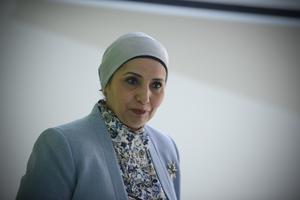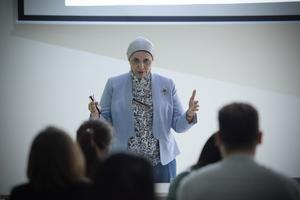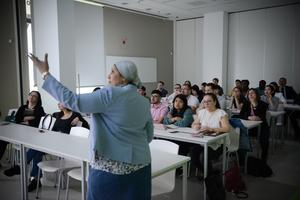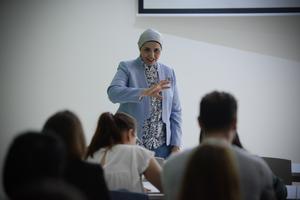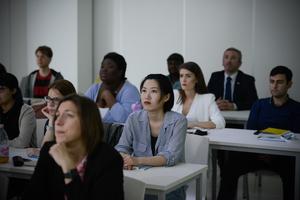On 16 April, Ms. Amany Ismail held a presentation about “Women’s political participation in Egypt: the role of National Council of Women” in the Orczy Residence Hall of the National University of Public Service.
“Women played a pivotal role in the recent revolutionary movements of 25 January and 30 June, 2011” - said professor Ismail in her opening speech. Following the long political battles, women have reached an unprecedented success during the last parliamentary elections by gaining 15% of the mandates. Compared to data from 2010 and 2012, this time the parliament has 89 female representatives, which is a historically significant number. To better analyze the results, she introduced the Egyptian parliamentary electoral system to the audience. Egypt's current electoral system is composed of a unique combination of two separate majoritarian electoral components including a two-round election where those who get 50%+1 vote will receive one of the 448 mandate and a so called “absolute closed list system”, which is the electoral list of the competing parties and coalitions. The latter provides 120 mandates. Ms. Ismail added that the number of available mandates on the lists can differ in the four electoral districts: there are two districts with 15 seats and two districts with 45 seats. She highlighted that according the the current electoral law, parties are obliged to represent different segments of the Egyptian society, including women. Thus, women must have at least 7 and 21 seats, depending on the districts.
During the 2015 elections, the representation of women has reached the highest number with 14.93%, compared to the 12% in 2010 and 2% in 2012. After women gained the right to vote in 1956, their representation within the parliament was moving between 0.2% and 2.6%. When the parliamentary quota system was in place, this number has even reached 10%.
Professor Ismail then talked about the role of the National Council for Women. The institution was established in 2000 with the aim of empowering women socially, economically and politically. The Council operates mainly with educational purposes and because of its political neutrality, it supports each candidate in the same way. “The Council is keen on supporting the political career of women regardless the social and cultural issues” - said the professor. In 2016, President El-Sisi announced the renewal of the National Council for Women, appointing an entirely new thirty-member board. The move has made NCW more diverse and its presidency was passed on to a younger generation with the election of Maya Morsy (a renowned Egyptian women’s rights advocate and a former UN Women country coordinator for Egypt). She emphasized that El-Sisi also appointed an equal number of women and men to the 28 parliamentary seats that are the Egyptian president’s prerogative to fill. It is also important to note that 2017 was declared as the Year of Women. She highlighted that the National Council for Women is currently working on the Women's Empowerment Strategy 2030 with the aim to include and empower women and to provide technological, educational and financial aid.
At the end of her presentation, she said that they will continuously working on achieving successes. It is important to keep working for the equal participation in the decision making process, for equal pay, economic status, improved working conditions, for better health care and social benefits and for the change of unconscious biases that limit the potential of women. One of the significant achievement that can already be seen are the six female ministers in the Egyptian governement appointed to, among others, Planning and International cooperation.
